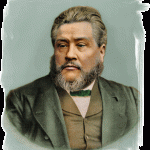 “He who grows in grace remembers that he is but dust, and he therefore does not expect his fellow Christians to be anything more. He overlooks ten thousand of their faults, because he knows his God overlooks twenty thousand in his own case. He does not expect perfection in the creature, and, therefore, he is not disappointed when he does not find it. When our virtues become more mature, we shall not be more tolerant of evil; but we shall be more tolerant of infirmity, more hopeful for the people of God, and certainly less arrogant in our criticisms.” – C.H. Spurgeon
“He who grows in grace remembers that he is but dust, and he therefore does not expect his fellow Christians to be anything more. He overlooks ten thousand of their faults, because he knows his God overlooks twenty thousand in his own case. He does not expect perfection in the creature, and, therefore, he is not disappointed when he does not find it. When our virtues become more mature, we shall not be more tolerant of evil; but we shall be more tolerant of infirmity, more hopeful for the people of God, and certainly less arrogant in our criticisms.” – C.H. Spurgeon
Category Archives: Questions and Answers
Choose Life!
 Question: How can you reject free will? Does not Moses say to the Israelites “Therefore choose life, that you and your offspring may live?” (Deut 30:19)
Question: How can you reject free will? Does not Moses say to the Israelites “Therefore choose life, that you and your offspring may live?” (Deut 30:19)
My good friend, John Hendryx of monergism.com answers:: Yes it is indeed true that God commands the Israelites to “choose life”, but when read in the context of the whole chapter, Moses reveals that the power to obey this command comes from regenerating grace:
“And the Lord your God will circumcise your heart and the heart of your offspring, so that you will love the Lord your God with all your heart and with all your soul, that you may live.” (Deut 30:6)
In other words, God commands people to obey, but he also supplies all the grace needed to do so. The command to believe does not itself contain the power to do so. God commanding obedience (what we ought to do) does not mean a person can do this apart from grace. God must set them free from innate love of sin and natural hostility to God, if they have any hope of moving toward Him. Left to ourselves we are too proud to let go of our self-complacency and self-righteousness and so we will never rightly understand our woeful, guilty, and lost condition unless God grants it.
So why did not all Israel believe? Because not all were children of promise. Some God left to their own boasted free will, letting them do what they wanted. In Romans 9: 6-8 it says of Israel:
“For not all who are descended from Israel belong to Israel, and not all are children of Abraham because they are his offspring, but “Through Isaac shall your offspring be named.” This means that it is not the children of the flesh who are the children of God, but the children of the promise are counted as offspring.”
 This means that spiritual circumcision was not given to all physical descendants of Abraham but to the children of promise in their midst. The rest were commanded but refused to obey. Some get mercy but the rest get justice.
This means that spiritual circumcision was not given to all physical descendants of Abraham but to the children of promise in their midst. The rest were commanded but refused to obey. Some get mercy but the rest get justice.
In 2 Chronicles 30:6-12 we also are given a glimpse of what takes place behind the scenes of how it is that some people believe the gospel while others do not:
So couriers went throughout all Israel and Judah with letters from the king and his princes, as the king had commanded, saying, “O people of Israel, return to the Lord, the God of Abraham, Isaac, and Israel, that he may turn again to the remnant of you who have escaped from the hand of the kings of Assyria. 7 Do not be like your fathers and your brothers, who were faithless to the Lord God of their fathers, so that he made them a desolation, as you see. 8 Do not now be stiff-necked as your fathers were, but yield yourselves to the Lord and come to his sanctuary, which he has consecrated forever, and serve the Lord your God, that his fierce anger may turn away from you. 9 For if you return to the Lord, your brothers and your children will find compassion with their captors and return to this land. For the Lord your God is gracious and merciful and will not turn away his face from you, if you return to him.”
10 So the couriers went from city to city through the country of Ephraim and Manasseh, and as far as Zebulun, but they laughed them to scorn and mocked them. 11 However, some men of Asher, of Manasseh, and of Zebulun humbled themselves and came to Jerusalem. 12 The hand of God was also on Judah to give them one heart to do what the king and the princes commanded by the word of the Lord.
Why did some believe? According to this passage, it is because God had mercy on them and gave them a heart to follow God’s command to repent. Notice that the rest scorned and mocked God’s word.
Continue reading
The Marks of a True Church
 What are the marks of a true church? I have heard people say there are three: 1. The preaching of the gospel takes place. 2. The sacraments are rightly administered. 3. Church discipline is exercised.
What are the marks of a true church? I have heard people say there are three: 1. The preaching of the gospel takes place. 2. The sacraments are rightly administered. 3. Church discipline is exercised.
I can see that all of these are biblical. But is that all one should look for? What about prayer, love, evangelism, discipleship and practical care for people, etc?
Thanks for your question. Of course, many sects call themselves a “church.” Such has always been the case throughout Church history. Because of this, the Protestant Reformers in coming to understand the true Gospel of Christ, sought to help people distinguish between true and false churches. Since early on in Church history, Christians have used the Apostles’ Creed and the Nicene Creed as confessions of faith. If a Church has a problem affirming these basic doctrines found in these catholic creeds (the word catholic here means universal, meaning that all orthodox Christians would affirm these truths) it leads me to think that they do not embrace true and sound doctrine. If a Church cannot affirm essential truths such as the Trinity or the full deity and humanity of Christ, then it is embracing something else, and anything else is a heresy. A heretical church by its very definition, cannot be a true church. It is vital that we get our doctrine right on the essentials of the faith. We only have to read Galatians chapter 1 to realise that if a church preaches another gospel, it comes under the anathema (the eternal curse) of God. That is why Martin Luther called the doctrine of sola fide (justification by faith alone) the article upon which the church stands or falls.
The Reformers were clear: The one true holy and apostolic church is present where (1) the word of God (and the Gospel) is preached and taught; (2) the sacraments of the church are rightly administered (namely baptism and the Lord’s Supper) and (3) church discipline is faithfully exercised. By implication, this third mark necessarily requires the presence of godly leadership (elders) who provide a safe place for the sheep to grow in Christ and who can ward off any wolves who seek to devour (see Acts 20). That is why Christians simply getting together for fellowship, though wonderful, without the oversight and care of elders, it does not consititute the gathering of a true Church. Christ, the Chief Shepherd has established His under shepherds for the care, protection and spiritual well being of His precious sheep (see Hebrews 13:17).
 In his Institutes, John Calvin wrote, “Wherever we see the Word of God purely preached and heard, and the sacraments administered according to Christ’s institution, there, it is not to be doubted, a church of God exists” (4.1.9). Buck Parsons commented on this by saying, “Calvin and the Reformers understood that the pure preaching of the Word and the right administration of the sacraments of baptism and the Lord’s Supper, which includes the practice of church discipline, were essential elements of a true church, with the implicit repudiation of false churches that did not conform to these fundamental biblical qualifications.”
In his Institutes, John Calvin wrote, “Wherever we see the Word of God purely preached and heard, and the sacraments administered according to Christ’s institution, there, it is not to be doubted, a church of God exists” (4.1.9). Buck Parsons commented on this by saying, “Calvin and the Reformers understood that the pure preaching of the Word and the right administration of the sacraments of baptism and the Lord’s Supper, which includes the practice of church discipline, were essential elements of a true church, with the implicit repudiation of false churches that did not conform to these fundamental biblical qualifications.”
Other things are vital for church life as you rightly observed. We could add many more things to your list in fact. However these things flourish only where the three marks of the church are present.
For instance, lets talk about love. Love is absolutely vital for the health of a local church, yet we need to ask “how do we distinguish true Christian love from all imitations?” We do so by being exposed to the word of God. When God’s word is rightly preached and taught it actually cultivates true Christian love amongst the flock. It is a function of faithful shepherds of God’s church to (at certain times) bring caring, Christ like and Biblically based discipline to the church’s members, both as an act of love and as a means of cultivating genuine and authentic love among the church’s members.
I heard a good illustration some time back that I feel is worth sharing. Think of the three indispensable elements of a house: a foundation, a frame, and a roof. Many things may be installed in a house, such as couches, chairs, curtains, sinks, toilets, a bath or shower, a washer and dryer, an oven, electrical wiring, beds and so on. I think having a good accurate clock is a good thing to have in a house too. I am sure we agree that the list could be endless. Yet though I may have all of these things in a yard somewhere, I really don’t have a house until I have the three essentials elements of a foundation, a frame, and a roof.
There are many essential elements for healthy church life. Yet unless the Word of God is rightly preached and taught, the sacraments rightly administered, and church discipline is faithfully exercised, there is no true church present. Where these marks are absent, true holiness will be absent too. If even one of these three marks are missing it should not be considered to be a true church of Christ.
